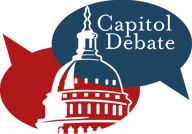Debate Paves Way to Business Success
Debating your way through life, can and usually, does lead to success
Law and politics have always known to be common career choices of competitive debaters; however, the great news is that the machinations of the sport are seeing a tremendous shift toward much broader careers, especially business.
The unique sport of Competitive Debate trains students to argue and advocate sides. In some events, such as Public Forum Debate, they often don’t know what side they will take until the last minute and are often required to switch sides in subsequent rounds.
While this seems as a perfect tutorial for lawyers, the debate discipline is most certainly awash with skills necessary to do well in business. Surely, debate teams will always remain a breeding ground for future lawyers and the politically ambitious; however, more than ever before, debate coaches are seeing more and more of their former students at or near the top of reputed corporations.
This is because debaters are required to do extensive research, be flexible, get to the point, as well as have the courage to assimilate mostly everything they learn on the fly. Debate teaches students to execute leadership decisions.
Key debate skills
CEOs and company presidents who have formal debating experience include Lance Rosenzweig of 2,500-employee outsourcing specialist PeopleSupport; Chuck Berger of Nuance Communications, a software company with more than 300 employees; Mark Astone of marketing and communications agency Paragraph; Tod Loofbourrow of 130-employee human resources software company Authoria; Karyl Innis of The Innis Co. executive coaching firm; and Harvey MacKay, whose company has more than 510 franchises in 11 countries.
Michael Beckley and Marc Wilson, co-founders of software company Appian, are also on the list. Before making the company happen, Beckley was a reputed debater at Emory University, while the latter competed for Dartmouth. In fact, the two competed against each other in national tournaments going back to the ninth grade. Wilson’s team at Dartmouth ranked No. 2 in the USA during his senior year.
Beckley and Wilson have said that their debate skills are a key when preparing for meetings with clients. Both will often play the role of skeptical customer, anticipating, and bouncing off arguments against one another. Having been trained to assume each side of an argument helps Wilson and Beckley deal with potential clients who are nothing less than Sun Java or Microsoft dot-com zealots. For example, a client might ask why it should hire them, when it could go to an IBM, Microsoft or Oracle. Both Wilson and Beckley have been trained through their debate years to answer effectively to such interrogations by customers who come with insightful but difficult questions.
They have also claimed that Appian may not have existed without their debate backgrounds. Beckley has even tried to explain to friends and co-workers how critical debate has been to his success.
Time is limited
Nuance’s Chuck Berger has said that he learned three things in debate that have helped in business. First, how to research and prepare a controversial topic with opposing viewpoints. Second, to make a compelling presentation. Third, to act quickly on his feet. Without the discipline, his company’s growth would have been unforeseeable.
Horrow Sports Ventures President, Richard Horrow, was a Northwestern Debater who twice won the Florida high school championship. He graduated from Harvard Law School but chose business, and now runs a company that has accumulated about 102 public-private stadium partnerships, including Paul Brown Stadium in Cincinnati and Miami Arena. Mr. Horrow also aligns towards the relevancy of debate in honing his multidisciplinary skills.
Increased Competition
Other CEOs who have been trained in debate say that their rise required adjustments to their win-at-all-cost mentality. Berger has said that good debaters are ruthlessly competitive, an admirable statement when dealing with an opponent, while not a subtle tactic for team building.
It is clear that debating, besides the argumentative and competitive skills, also teaches listening skills and winning allegiances. Since debaters are able to see others’ views clearly, getting and succeeding into business is quite similar to winning a tournament.
Earlier, debate competition was touted to accrue a plethora of law school graduates. It is safe to say that today, this scenario has taken a wide turn.
More than ever before, debate students are choosing and becoming successful in a variation of professions, such as business, politics, science, technology, and arts. No longer is it necessary to pick a career that directly resonates to debate. In this growing, knowledge based economy, well-spoken individuals with remarkable critical thinking skills are in demand.
